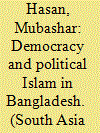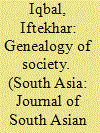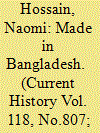| Srl | Item |
| 1 |
ID:
106547


|
|
|
|
|
| Publication |
2011.
|
| Summary/Abstract |
This article examines the deeply contested approaches of 'political Islam' towards modern democracy in Bangladesh, the third largest Muslim country in the world, where sharia law is not the source of public law and where a democratic government is in place. Selecting the political manifestos and constitutions of three different influential Islamist parties, the Jamat e Islami Bangladesh, Hizbut Tahrir Bangladesh and Jamatul Mujahedeen Bangladesh, the study examines through discourse analysis why Islamists take such a hostile approach towards democracy. At first sight, Islamists desire the establishment of an alternative governing system, such as the Caliphate, to replace the present parliamentary system of governance in Bangladesh. Islamists also advocate a change of state philosophy from 'People's Republic of Bangladesh' to an 'Islamic State', arguing that sharia should be the legal framework of the country. The key finding of this research, however, is that Political Islam in Bangladesh is also perceived as a reaction to globalisation and that this global aspect, in theory and practice, may be more powerful as a reactive agent than local/national politics.
|
|
|
|
|
|
|
|
|
|
|
|
|
|
|
|
| 2 |
ID:
153020


|
|
|
|
|
| Summary/Abstract |
This paper explores the anxious and sometimes hostile relationship between modern forms of civil society and non-modern institutions in Bangladesh. I argue that an uneasy relationship arises from civil society's inability or lack of initiative to identify and negotiate with ‘pre-modern’ social institutions and their remnants, which I conceptualise here as samaj. Such dissonance and disengagement have been historically constructed largely with regard to the way in which the roles of the state, capital and market forces have been conceptualised at the interface between ‘modernity’ and ‘tradition’. This proposition demands a genealogical understanding of the relationship between civil society and samaj, in which the latter is represented by religious institutions such as the khanqah and the madrasa.
|
|
|
|
|
|
|
|
|
|
|
|
|
|
|
|
| 3 |
ID:
164851


|
|
|
|
|
| Summary/Abstract |
Few big countries ... have had their fortunes so profoundly shaped by a weak position in the global system.”
|
|
|
|
|
|
|
|
|
|
|
|
|
|
|
|